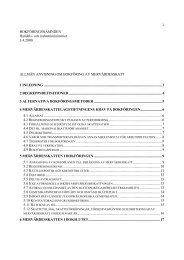Knowledge Intensive Services' Suppliers and Clients
Knowledge Intensive Services' Suppliers and Clients
Knowledge Intensive Services' Suppliers and Clients
Create successful ePaper yourself
Turn your PDF publications into a flip-book with our unique Google optimized e-Paper software.
15<br />
We can see KIBS in general as problem-solvers. Some traditional professional<br />
services deal with problems associated with social systems <strong>and</strong> institutions,<br />
especially administrative rules <strong>and</strong> regulations (e.g., legal <strong>and</strong> accountancy<br />
services). Less formally governed problems concerning social groups <strong>and</strong> interests<br />
are at the heart of many marketing <strong>and</strong> issues consultancy services, for example.<br />
Other services support interorganisational activities (supply chain management,<br />
etc.). Some KIBS have more of a focus on psychological <strong>and</strong> biological problems,<br />
as with medical <strong>and</strong> veterinary services, educational <strong>and</strong> clinical psychology <strong>and</strong><br />
psychiatry, counselling, etc. Others are more concerned with the physical world -<br />
for example, engineering services concerned with construction systems or transport<br />
infrastructure; laboratory testing <strong>and</strong> research services concerned with the<br />
properties of materials, chemicals, devices; <strong>and</strong> IT services of various kinds<br />
concerned with symbol-processing or with the configuration <strong>and</strong> integration of<br />
discrete items of hardware <strong>and</strong> software. The S&T-related KIBS especially may<br />
play a strong role in diffusing new materials <strong>and</strong> systems to their own clients.<br />
Some KIBS are hard to locate as being either S&T-based or more traditional<br />
professional services. This is particularly true in fields such as architectural <strong>and</strong><br />
design services. Here we find many firms carrying out quite routine work, but<br />
others who combine aesthetic creativity with technological innovation – or at least<br />
with a frequent search for new technologies that they can exploit. KIBS may<br />
become involved in their clients’ technology strategies (e.g. the many professional<br />
service firms in accounting <strong>and</strong> management consultancy who have developed<br />
capabilities in IT consulting for clients). Some KIBS in traditional professional<br />
service sectors develop strong competencies in technology-related fields. For<br />
example, some lawyers specialise in IT in patent law, some financial advisors <strong>and</strong><br />
market analysts become expert in high-tech or consumer innovation fields. It is<br />
particularly useful for many KIBS in processing their information, <strong>and</strong> they<br />
become users of Computer Aided Design packages, systems to transmit rapid<br />
intelligence updates to clients, etc.<br />
Other KIBS more evidently feature technology as their core activity, as is reflected<br />
in the high levels of Qualified Scientists <strong>and</strong> Engineers typically present in their<br />
workforce. Such technology-related KIBS have important roles to play in<br />
innovation processes (cf. Miles et al [1995] <strong>and</strong> Bilderbeek et al [1998]). There are<br />
services that actively conduct research <strong>and</strong> development into new technologies –<br />
R&D services, by the turn of the millennium, were accounting for 10 % of business<br />
R&D n the UK. Closely allied to these are services that perform testing of various<br />
sorts (often for conformance purposes). A rather different sort of testing is<br />
performed by rapid prototyping services, which construct models or full-size<br />
versions of designs so that, for example, difficulties with the production process or
















